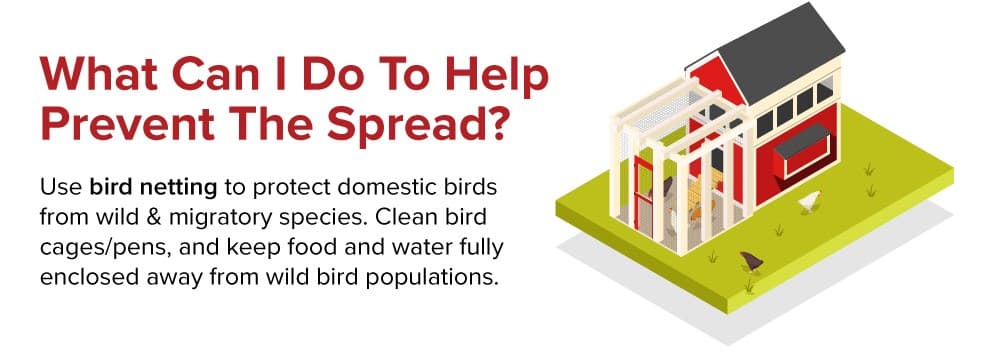Please add the schema tags below
Learn 4 Things About the Bird Flu - Avian Influenza Symptoms
Avian Influenza, commonly referred to as bird flu or the avian flu, is a disease that can be contracted as a result of being infected by avian influenza Type A viruses.
Here are 4 important things to know about Avian Influenza or Bird Flu
- How Does Bird Flu Affect You?
- Can Avian Flu spread to people?
- What can I do to help prevent the spread?
- How do Birds Spread Avian Flu?

How Does Bird Flu Affect You?
When most of us think of avian flu we immediately worry about contracting the virus and getting sick, which is a valid reaction. Luckily, this is something most of us don’t have to worry about.
The real problem occurs when wild bird populations infect poultry farms, backyard chicken coops, and other domestic and captive birds across the country.
Avian Flu affects the supply, demand, and cost of products such as chicken, turkey, eggs, and other poultry products throughout the country. You can see the effects in the poultry industry as they combat the spread of bird-to-bird contamination. Prices per pound of chicken, turkey, and duck may fluctuate while poultry farms fight to protect their livestock from interacting with infected wild birds.
Pet owners, bird enthusiasts, and owners of backyard chicken coops should always take precautions to protect their beloved birds. Direct contact with infected wild birds can be detrimental to domestic birds.

Can Avian Flu Spread to People?
The short answer is yes, people can contract the Bird Flu. But, as we mentioned earlier in this blog, the chances of humans contracting the virus are relatively low, as stated by the CDC. In the rare case a person contracts bird flu, it’s usually due to the lack of personal protective equipment (PPE) and/or close prolonged exposure to infected birds.
Just because the chances of contracting bird flu are low, does not mean you shouldn’t take precautions to help prevent the spread of the virus. Those who are at the highest risk of contracting bird flu are people working close to and/or in direct contact with infected birds. Examples of this can be seen within the poultry industry.
What Can I Do to Help Prevent the Spread of Bird Flu - Avian Flu Safety Measures?
Practicing safety measures becomes increasingly important during times like this to prevent the spread of the Bird Flu. Use bird netting or other exclusionary deterrents to protect domestic birds from wild & migratory species. Clean bird cages/pens, and keep food and water fully enclosed away from wild birds. These methods can be adopted for pets, small-scale backyard chicken coops, to even large-scale poultry operations.
The following are steps that everyone can take to mitigate the spread of Avian Flu:
- Wear masks and proper protective equipment when in contact with birds, poultry, and infected animals
- Avoid touching your mouth, nose, or eyes
- Washing your hands after touching birds or handling poultry
- Avoid touching surfaces contaminated by wild birds

How Do Birds Spread Avian Flu?
Birds spread disease in several ways such as through their saliva, mucous, and most notably their feces. As we discussed above, the spread of the Avian Influenza viruses can occur most notably in the form of bird-to-bird contact.
- Learn more about How Birds Spread Disease
The largest contributor to the spread of avian flu is not from birds-to-people, but from wild bird populations to domestic and captive birds, as well as vice versa. We see that wild bird populations spread the virus by encountering domesticated bird populations in poultry farms, pet birds, and backyard or hobbyist flocks.
Wild waterfowl and aquatic birds such as geese, ducks, swans, gulls, and other shorebird species become carriers of the virus. It can be hard to tell signs of infected birds as most wild birds are asymptomatic and do not show signs of sickness.
In Conclusion
Although people are at low risk of contracting Bird Flu, the effects of the virus are seen within wild and domestic bird populations. These effects are harmful to the poultry and food processing industries worldwide. If you want to learn more about Avian Influenza, we highly recommend visiting the CDC website where the most up-to-date information can be found.
Our team of Bird Control Experts are happy to discuss bird control methods such as the use of bird netting and other exclusionary products.


